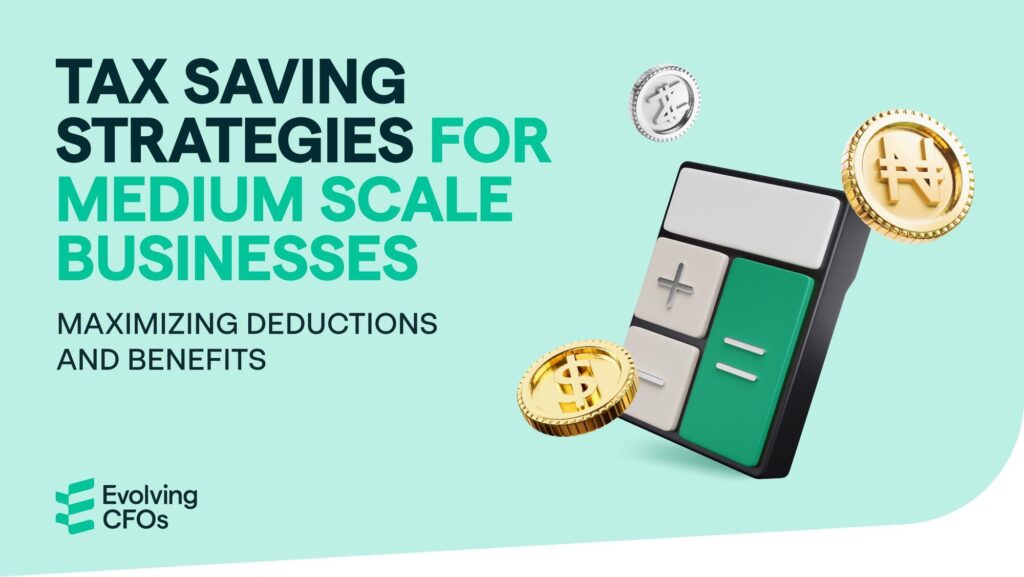Tax planning is a crucial aspect of managing a successful business in Nigeria, especially for medium-scale enterprises. Navigating the intricacies of the Nigerian tax system and implementing effective tax-saving strategies can have a significant impact on your company’s profitability and long-term growth. In this article, we will delve into practical and actionable tax-saving strategies specifically tailored for medium-scale Nigerian businesses, helping you maximize deductions and benefits while ensuring compliance with local tax regulations.
Stay Informed on Tax Regulations
Tax laws in Nigeria are subject to changes and updates. To effectively plan your tax strategy, it is essential to stay informed about the latest regulations, allowances, and exemptions. Regularly consult reputable sources such as the Federal Inland Revenue Service (FIRS) and engage the services of a qualified tax professional who can guide you through the intricacies of Nigerian tax laws.
Utilize Allowable Business Expenses
Understanding and accurately categorizing allowable business expenses is vital for maximizing deductions. In Nigeria, eligible business expenses include rent, salaries and wages, utility bills, advertising costs, professional fees, training expenses, and travel expenses directly related to business operations. By diligently tracking and documenting these expenses, you can optimize deductions and reduce your taxable income.
Take Advantage of Investment Incentives
The Nigerian government offers various investment incentives to promote economic growth and attract investments. Familiarize yourself with these incentives, such as pioneer status, tax holidays, and exemptions provided for specific industries or regions. These incentives can significantly reduce your tax liability and free up business expansion and investment resources.
Leverage Capital Allowances
Capital allowances allow businesses to claim deductions on the depreciation of certain assets used for business purposes. These assets include buildings, machinery, vehicles, and computer systems. Understanding the applicable rates and rules for capital allowances can help you maximize deductions and reduce your taxable income. Consult with a tax professional to ensure accurate and compliant calculations.
Explore Tax Credits and Incentives
In addition to deductions, as a Nigerian business, you can benefit from tax credits and incentives. For instance, the Industrial Training Fund (ITF) offers tax credits for businesses contributing to employee training and development. Similarly, the Nigerian Content Development and Monitoring Board (NCDMB) provides incentives for companies that prioritize local content and employment. Research and take advantage of these credits and incentives specific to your industry to further reduce your tax burden.
Consider Incorporation and Entity Structure
Choosing the right business entity structure can have significant tax implications. Incorporating your business as a limited liability company (LLC) can provide benefits such as limited liability protection and potential tax advantages. Consult with legal and tax professionals to determine the most suitable entity structure for your business, taking into account factors such as liability, scalability, and tax optimization.
Engage Experienced Tax Professionals
Navigating the Nigerian tax landscape can be complex, so it is prudent to engage the services of qualified tax professionals. Tax professionals possess in-depth knowledge of local tax laws and can help you navigate compliance requirements, identify eligible deductions and incentives, and ensure accurate tax filings. Working with experts allows you to focus on growing your business while maintaining confidence in your tax strategy.
Implementing effective tax-saving strategies is essential for any medium-scale Nigerian business aiming to optimize deductions and benefits. By leveraging the factors mentioned above you can reduce your tax liability while remaining compliant with Nigerian tax laws. Every business has unique circumstances, hence it is vital to seek personalized advice to develop a comprehensive tax plan that aligns with your goals and maximizes your tax-saving potential.




